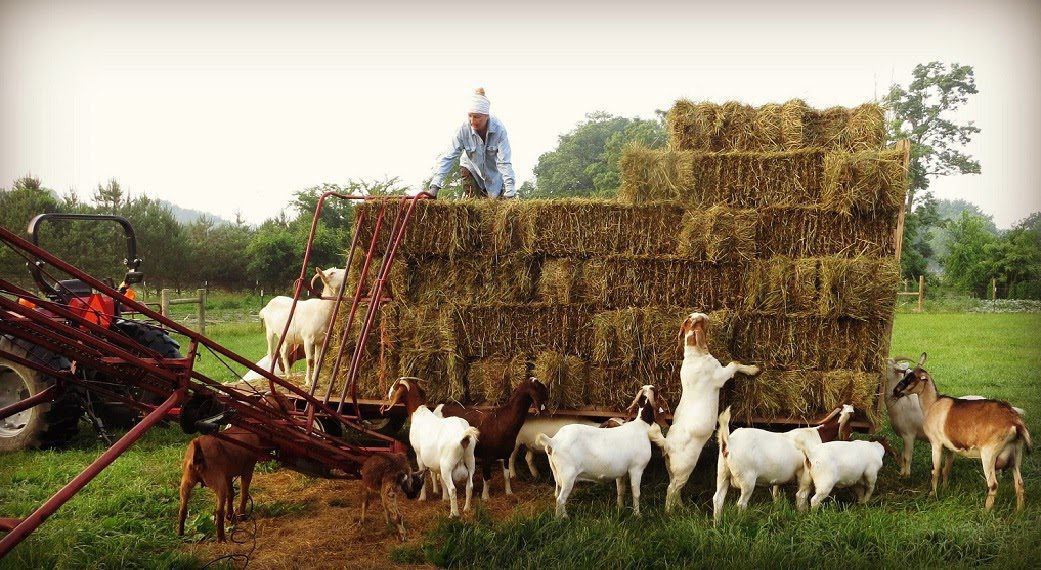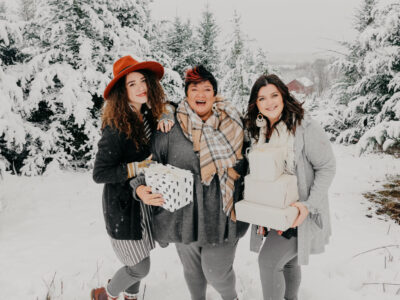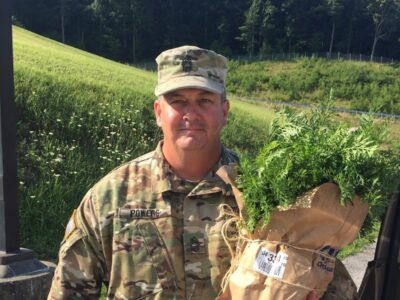Annette Kohlhagen Fleck wanted to be a farmer. She wanted to marry one too. And in 1947, she did. Now she was in business — keeping the records, managing operations, meeting the challenges of an ever-changing market, all the while housing three generations, raising four children, and supporting her husband in his work. For 50 years, she rose to the occasion, turning a small farm into a wealthy enterprise. Little did she know that the legacy she was building would inspire thousands of American women to grow their own agricultural empires. Two of those women form the CEO team of Annie’s Project – Education for Farm Women (APEFW), embodying the mission to empower farm and ranch women to be better business partners through networking and management of critical information.
Doris Mold lives in “the middle of nowhere” Wisconsin on a dairy farm she and her husband joyfully manage. Mold also keeps a legendary 2-acre garden. Karisha Devlin has deep roots in northeast Missouri, where she heads up a grain operation with her husband. They were in the midst of a busy corn and soybean harvest when we spoke. Both women share the CEO role in addition to multiple roles, including mother, educator, farmer, and business owner. Mold says: “Some people find it challenging, but I feel like Karisha and I, we are each other’s allies. It’s not a competitive thing.” Devlin agrees, “It’s a partnership. We both have the same end goal. We draw out the strengths in each other because while we’re the same in a lot of ways, we also have strengths in different areas. I feel like together, we’re a powerhouse.”
Though Devlin and Mold stepped up to lead Annie’s Project only this summer, they’ve both served the organization for years. Their shared enthusiasm for the mission, coupled with a wealth of experience, makes them a powerhouse team indeed. As a past president of American Agri-Women, the largest coalition of American women in agriculture, and an educator with a background in farming agribusiness management, Mold was asked to join the Annie’s Project board of directors in 2015. Devlin came in as a young ag extension educator in 2005, helping to shape Annie’s Project curriculum with founder Ruth Hambleton. Devlin went so far as to focus her doctoral dissertation on the work of Annie’s Project in three key states, Iowa, Illinois, and Missouri, tracking graduates of the program over a ten year period to measure whether their mission to educate, build networks and empower growth was translating into a tangible impact.

For the past 17 years, Annie’s Project has offered educational programming to over 15,000 women farmers and ranchers across 33 states, led by 350-plus facilitators. Those state and local facilitators volunteer upwards of 6,000 hours a year to keep the programs running in partnership with local businesses and organizations who often host the classes. Their bread and butter courses offer 18 hours of crucial risk management training, covering everything from record-keeping, succession planning, estate management, marketing crops, soil survey, and crop insurance. Devlin was surprised to find throughout her 10-year study that beyond risk mitigation or skills development, the most impactful element Annie’s Project offers is connection. “When I first started the dissertation, I was looking more into what they learned and how they implemented that in their operations, but through the interviews, it just consistently came back that networking was so important to the women.”
The farming life can be an isolating one, especially for women. Devlin says that’s partly due to the fact that women are seen as a minority in agriculture. Even if they end up on ag boards like Mold and herself, they are often there as “tokens,” not as equal representatives. Mold attributes this to the fact that they’re just not being counted. Serving on the USDA ag statistics advisory committee for six years, Mold spoke up: “we know that there are more women out there farming than what you’re counting.” She was appointed to a special task force to explore ways the Census of Agriculture could get a more accurate account, and when the 2017 census rolled around, “we knew in our heart of hearts that we were going to get a better count.”
The results proved Mold to be correct. The 2017 Census of Agriculture showed a 27% increase in the number of female farmers when compared to the 2012 census. “It wasn’t that women have suddenly decided we’re all going to be farmers. Of course, there are new women farmers coming in all the time, but it was that we finally asked the right questions, and women were finally being counted. Women are finally starting to claim that space. They’re saying, ‘I’m a farmer too, it’s not just that my husband farms or I’m a farm wife,’ they’re saying ‘no, I farm.’ Sometimes they farm with a spouse or with their children, and sometimes they’re the farmer for the farm. We are seeing a cultural shift.”
Mold explains that culture is a big part of how people respond to the census. Sometimes out of deference, only the senior male is counted as the farmer, neglecting women, and younger generations working on the family farm. Sometimes women do not regard themselves as farmers, even though they handle the books and manage operations. Often women have second jobs outside the farm to provide health insurance for the family. As Hambleton told The Fence Post, “women are primarily the record-keepers in the family, and sometimes they have to use those records to make the tough decisions.”

Making those tough decisions is what Annie’s Project is equipping women to do. “We’ve had instances where women have gone through the program, and then afterward, they’ve lost their husbands. One woman had young kids, and she was being pushed to sell the farm, but two of her sons wanted to farm, and she felt really strongly about holding on to it,” Devlin recounts. “She talks about not only the knowledge she learned in Annie’s Project but the networks that she made that helped support her and give her strength during this time. She had to get rid of her banker; she had to get rid of her attorney, she had to get rid of her insurance agent, you know everybody that was saying ‘no, you can’t do it because you’re a woman and you have young kids, this is not going to work.’ She ended up surrounding herself with people who believed in her and her vision. Now her sons are in their mid-20s, and she farms with them. Having those people who believed in her and her vision helped her move forward.”
These are the kinds of real-life experiences that motivate Mold, Devlin, and hundreds of Annie’s Project volunteers to continue expanding their reach with research-powered intention. This summer, they launched a census of their own, a leadership survey for women to gauge their community, state, and nationwide involvement. They are currently tabulating over 1,500 results from 49 states. And while the pandemic has put a halt to the majority of Annie’s Project courses, including the potluck meals that almost magically appear along with them, the community is still going strong. Online and socially-distanced classes are in development, and upcoming courses can be found here.
Back at virtual HQ Mold and Devlin are intent upon shepherding that community with grace. “We put a lot of hard work into what we do but, there are things that come up,” Devlin explains. “We have farms; we have families, we have other professional commitments as well. If something doesn’t happen right away — both of us have had sick children in the last couple of weeks — you don’t get stressed out about it. It’s not the end of the world. You just say ‘hey, I need some more support, or I’m gonna be a little late on this,’ and we roll with it. Because that’s life.” Mold is in full agreement: “We shoot for excellence. But, I think women tend to try for a little more than that. Look at what we demand from ourselves as women and look at society out there, demanding that we do it all and that we do it all really well. Certainly, we try, but you know that’s impossible. We have to remind ourselves to extend grace. We can’t do all things perfectly; sometimes, it’s messy, but that’s okay, it’s about moving forward, and it’s about getting it done.” Devlin smiles at Mold from across the screen: “Our goal is to empower women, and it feels like we’re empowering each other too.”





 Copyright
2024
Root and Vine
Copyright
2024
Root and Vine